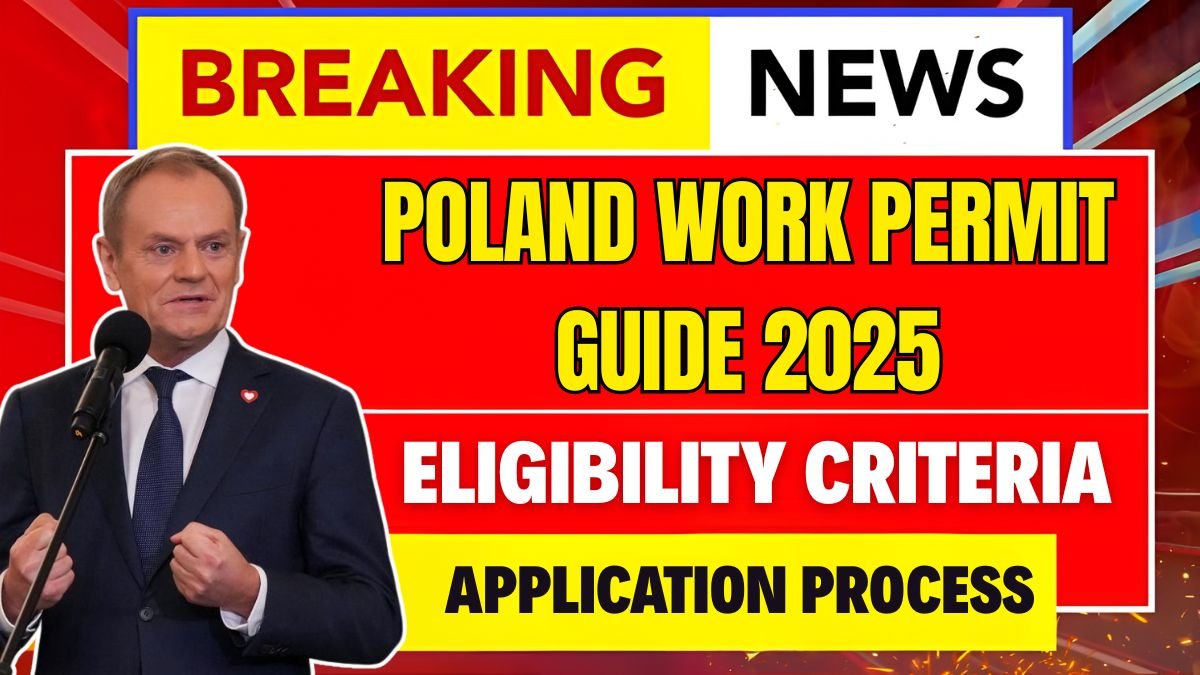In today’s era, when people from all over the world are moving to other countries in search of better lives and career opportunities, Poland has emerged as one of the few European countries that is not only economically stable but also has a comparatively low cost of living and working there. This is the reason why thousands of people looking for work in sectors like IT, healthcare, construction, agriculture, and manufacturing are now considering Poland as a suitable destination. In 2025, the Polish government has made the work permit process more transparent, structured and easy so that both foreign workers and employers can complete the process with fewer complications.
Why is working in Poland attractive?
If you are wondering why people are attracted to Poland, then there are many solid reasons behind it. First of all, Poland is a fast-growing country in Europe where the economy is stable and there is no shortage of jobs. Apart from this, the cost of living there is quite affordable compared to other European countries, which is a matter of relief for new immigrants. As Poland is part of the European Union, it falls within the Schengen zone, making it extremely easy to travel to the rest of Europe. Plus, the country is safe, culturally rich, and welcoming to foreign nationals.
What is a Poland work permit?
A work permit is an official document that gives a foreign national the legal right to work in Poland under a particular company. The permit is issued for a set period of time, clearly stating the name of the company, place of work, position, and duration of the contract. It is important to understand that a work permit is not a visa or residence permit. A citizen of a non-EU country needs a separate visa or residence permit to stay in Poland.
Types of work permits in Poland
In 2025, the Polish government has set five main types of work permits:
- Type A: When a foreign national gets a direct contract in a Polish company.
- Type B: This is for those who are part of the company’s board and stay in Poland for more than 6 months in 12 consecutive months.
- Type C: If the person is sent by a foreign company to work in a Polish branch.
- Type D: When sent by a foreign company to Poland to perform temporary service.
- Type E: For cases that do not fall into any of the categories above.
Most people apply for a Type A work permit as it covers general jobs.
Eligibility Criteria
There are a few prerequisites you need to meet before you can apply for a work permit:
- A valid job offer from a recognized company in Poland.
- Sometimes it is necessary to take a “labor market test” to give preference to local citizens.
- Your educational qualifications and work experience must match the position.
- A clean police record is a must.
- Passport must be valid and health must be good.
Special certificates or degrees may also be required for some professions.
Required Documents
Documents to be provided by the employer:
- Application form for work permit.
- Work contract or job offer letter.
- Company registration certificate.
- Description of business activities.
- Labor market test report (if required).
- Receipt of payment of application fee.
Documents submitted by the foreign worker:
- Photocopy of passport.
- Passport-size photo.
- Educational certificate.
- Required professional license.
- Resume (CV).
- Police verification certificate.
- Medical certificate.
All documents must be translated into Polish by a certified translator.
Application process: step by step
- Job search—First of all, it is necessary to get a job from a Polish company.
- Labor market test—If necessary, it is necessary to prove that local citizens are not available.
- Application for work permit—The employer applies to the local voivodeship office.
- Application review—After verification of documents, the permit is issued in 4–8 weeks.
- Receiving a copy of the work permit—A copy of the issued permit is given to the employee.
- Apply for a work visa (for non-EU citizens)—Apply for a visa at the Polish embassy.
- Entry to Poland and start work—Once you have received a visa, you can start working in Poland.
- Apply for a residence permit if the duration is more than 3 months— A residence permit is required for longer periods.
Work permit duration and renewal
A work permit is usually valid for 1 to 3 years and can be renewed further. Note that a new permit will be required if you wish to change employers or jobs.
Rights of work permit holders
- Right to work legally in Poland.
- Access to healthcare and public services.
- Opportunity to apply for permanent residence after a few years.
- Allowed to bring family in some cases.
Final thoughts
If you are looking for better career opportunities abroad, Poland can be a great option for you. The work permit system here has now become more transparent, organized and easy. All you need is the right information, patience and following the legal process. If you prepare by keeping in mind all the steps and conditions given above, then making a career in Poland can be a true dream.
FAQs
Q. Who needs a work permit to work in Poland in 2025?
A. Any non-EU foreign national who wants to work legally in Poland must obtain a valid work permit before starting employment.
Q. What is the most common type of work permit in Poland?
A. Type A work permit is the most common, issued to foreigners employed directly by a Polish company under a job contract.
Q. How long does it take to get a Poland work permit?
A. The processing time usually takes between 4 to 8 weeks, depending on the completeness of documents and the region.
Q. Can I change employers with the same work permit?
A. No, work permits are employer-specific. To switch employers, you must apply for a new work permit.
Q. Is a work permit the same as a visa or residence permit?
A. No. A work permit allows you to work, but you still need a National D visa to enter Poland and a residence permit to stay long-term.


